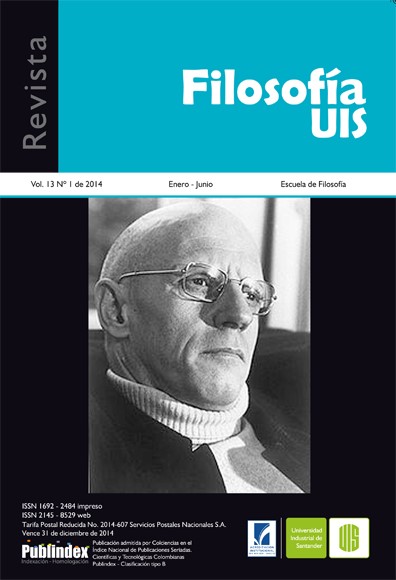Power and knowledge, mechanisms of discursive reproduction and social breakup
Published 2014-04-29
Keywords
- power,
- speech,
- social division,
- code,
- knowledge
How to Cite
Copyright (c) 2014 Jorge Leonardo Ortiz Guzmán, Karime Vargas Cáceres

This work is licensed under a Creative Commons Attribution 4.0 International License.
Abstract
The topic of speech has been an object of study in recent years. It can be considered a social practice through which humans communicate and by which they bring themselves together. The present article serves as a reflection on the concept of speech itself, principally in the light of the theories proposed by Michel Foucault and Basil Bernstein, some of whose more important works will be referenced throughout, which provide a base for this work. It suffices to say that by reading this document one may arrive at a simple understanding of the theme, which will be supplemented by timely ideas from the aforementioned authors. First of all, the concept of speech is clarified and its direct relationship to power and knowledge is established; elements here responsible for social divisions, divisions based on the codes that circulate in an unequal manner among them.
Downloads
References
- Bernstein, B. (1996). Pedagogía, control simbólico e identidad. Madrid: Morata.
- Bernstein, B. (2001). “Códigos, modalidades y el proceso de reproducción cultural: un modelo”. La estructura del discurso pedagógico. Madrid: Morata.
- Cajiao, F. (1994). Poder y justicia en la escuela colombiana. Bogotá: Fundación FES.
- Calsamiglia, B. y Tusón Valls, A. (1999). Las cosas del decir. Barcelona: Ariel.
- Foucault, M. (2000). Defender la sociedad. Buenos Aires: Fondo de Cultura Económica.
- Foucault, M. (2002a). La arqueología del saber. Buenos Aires: Siglo XXI.
- Foucault, M. (2002b). Vigilar y castigar. Buenos Aires: Siglo XXI.
- Foucault, M. (2005). El orden del discurso. Buenos Aires: Tusquets.
